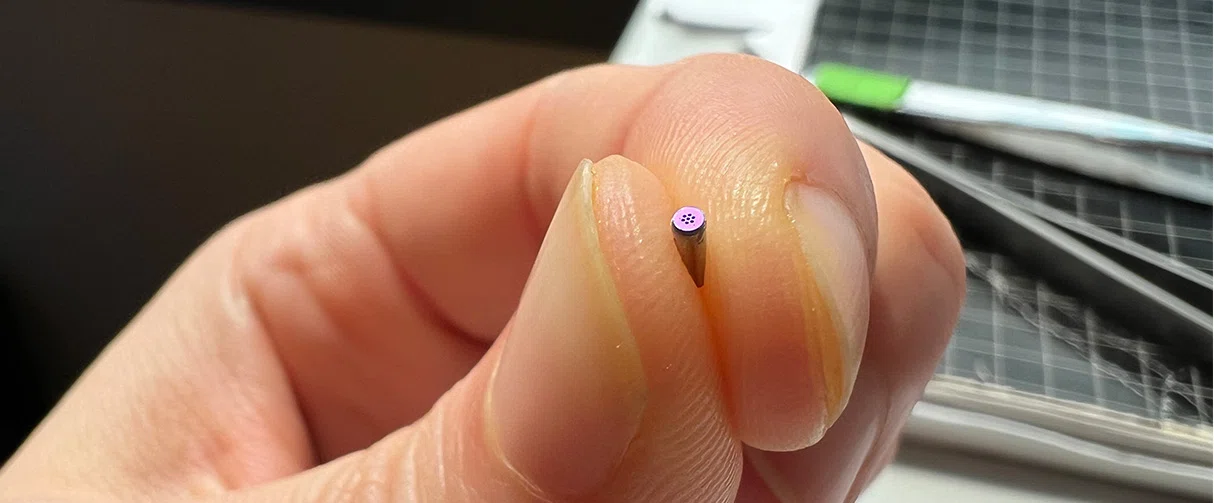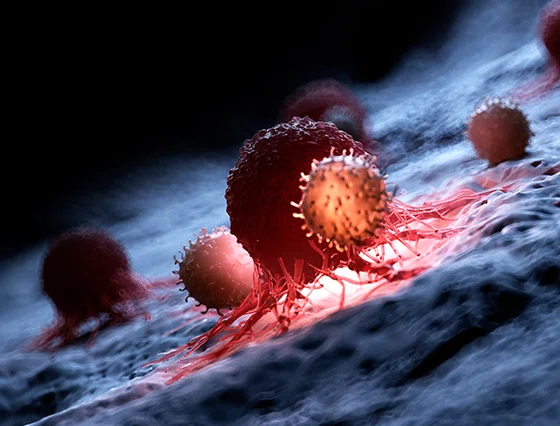


PRECISION MEDICINE
Implanting Seeds of Hope
Houston Methodist researchers deliver immunotherapy directly into pancreatic tumors with cutting-edge nanofluidic drug-eluting seeds (NDES), offering hope for the future of cancer therapeutics.

Pancreatic ductal adenocarcinoma (PDAC) is one of the most lethal diseases, with an average five-year survival of less than 10%. Unfortunately, at the time of diagnosis, most cases are unresectable, locally advanced or metastatic. Standard treatments such as chemotherapy, radiation and surgery, do not generally improve survival. Studies have revealed that the PDAC microenvironment supports tumor growth and promotes metastasis, and that the dense tumor stroma is a physical barrier to drug delivery. Due to PDAC’s aggressive nature and intrinsic resistance to chemotherapy, it’s imperative to develop more effective therapeutic strategies against the disease.

Alessandro Grattoni, PhD

Corrine Ying Xuan Chua, PhD

Our goal is to transform the way cancer is treated. We see this device as a viable approach to penetrating the pancreatic tumor in a minimally invasive and effective manner, allowing for a more focused therapy using less medication

Alessandro Grattoni, PhD
Chair of the department of nanomedicine at Houston Methodist
Making the most of immunotherapy
Toward this end, Houston Methodist researchers are using a novel approach — nanofluidic drug-eluting seeds (NDES) — to successfully deliver immunotherapy directly to tumors in a murine model of pancreatic cancer. In a study published recently in Advanced Science, Corrine Ying Xuan Chua, Ph.D., co-corresponding author and assistant professor of nanomedicine, along with Dr. Alessandro Grattoni PhD, co-corresponding author and chair of the department of nanomedicine at Houston Methodist and their team, show that sustained low-dose intratumoral delivery of CD40 mAb via the NDES, modulates the immune microenvironment of the tumor to reduce tumor burden. In addition, NDES-induced tumor reduction requires only a quarter of the dose that is required for systemic treatment, which also abrogates deleterious effects. This revolutionary and minimally invasive device, which is smaller than a grain of rice, penetrates the PDAC immune barrier to deliver effective and safe anti-tumor treatment.
Immunotherapy leverages interactions between antigen-presenting cells (APC) and T cells to generate anti-tumor immunogenic responses. APCs induce T cell priming, where activated T cells recognize tumor-specific antigens and incite tumor-targeted cytotoxicity. CD40 is a tumor necrosis factor (TNF) receptor member expressed on many immune cell types and activated CD40 can license dendritic cells to promote antitumor T cell activation and re-educate macrophages to destroy tumor stroma.
Current clinical trials are exploring the therapeutic impact of CD40 agonist antibodies, but results are discouraging as systemic administration leads to adverse events such as cytokine storm, hepatotoxicity and thromboembolism. In theory, local drug delivery would confine drugs to the tumor microenvironment to increase bioavailability and improve efficacy while minimizing systemic toxicities.
Chua explained the limitations of current local delivery strategies, “Effective local delivery necessitates precise injection into the tumor and hinges on confining drugs locally for an extended duration. However, current clinical variations in intratumoral administration approaches include different injection techniques which could affect delivery and consequently, treatment efficacy.”
To overcome these obstacles, Chua, Grattoni, and their team developed NDES — a single-administration extended-released platform that avoids repeated injections or variations in administration technique.
“Our goal is to transform the way cancer is treated. We see this device as a viable approach to penetrating the pancreatic tumor in a minimally invasive and effective manner, allowing for a more focused therapy using less medication,” said Grattoni, whose lab focuses on implantable nanofluidics-based devices for controlled and long-term drug delivery and cell transplantation to treat a variety of diseases.
Using NDES, the team delivered CD40 agonist mAb intratumorally in murine PDAC models. NDES implantation is minimally invasive, using a technique similar to brachytherapy seed insertion for prostate cancer. The NDES treatment resulted in significant tumor reduction.
Chua elaborated, “One of the most exciting findings was that even though the NDES device was only inserted in one of two tumors in the same animal model, we noted shrinkage in the tumor without the device. This means that local treatment with immunotherapy was able to activate the immune response to target other tumors. In fact, one animal model remained tumor-free for the 100 days of continued observation."
Research is ongoing to further assess safety and efficacy of this technology. And though it’s not quite ready for clinical trials, the researchers would like this to become a viable option for cancer patients in the next five years. You can follow them and their progress on social media.
Hsuan-Chen Liu, Daniel Davila Gonzalez, Dixita Ishani Viswanath, Robin Shae VanderPol, Shani Zakiya Saunders, Nicola Di Trani, Yitian Xu, Junjun Zheng, Shu-Hsia Chen, Corrine Ying Xuan Chua, and Alessandro Grattoni
This research received funding support from the Nancy Owens Breast Cancer Foundation, Golfers Against Cancer and the National Institutes of Health (NIH-NIGMS R01GM127558).
Heather Lander, PhD
May 2023
Related Articles








